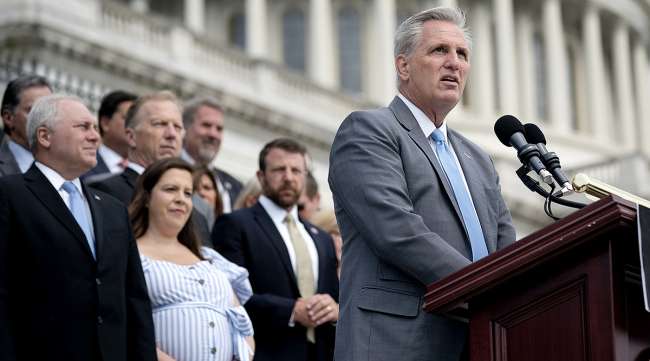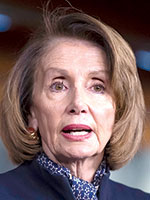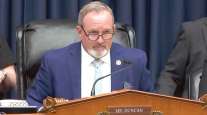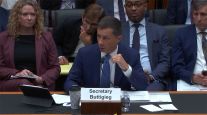Senior Reporter
Congressional Republicans, Moderate Democrats Balk at $3.5 Trillion Budget

[Stay on top of transportation news: Get TTNews in your inbox.]
Top congressional Republicans announced their opposition to Democratic leaders’ pursuit of a $3.5 trillion budget plan that would be considered alongside a big-ticket infrastructure package. Separately, a small group of moderate House Democrats took issue with their party’s legislative timeline.
Kevin McCarthy of California, the U.S. House of Representatives’ top Republican, is leading the opposition to Speaker Nancy Pelosi’s aim of kicking off an intricate budget process in the chamber. Pelosi (D-Calif.) scheduled a vote Aug. 23 to begin consideration of the multitrillion dollar budget and infrastructure measures.
“Democrats want to crush hard-working Americans and their families. With prices hitting a 13-year high, [President Joe] Biden’s inflation is wiping away wage gains made during the [President Donald] Trump years. Democrats are determined to make it worse by passing a $3.5 trillion socialist spending binge that will crush families, dismantle our economy, and reshape our country in the worst possible way,” McCarthy said.
“House Republicans firmly oppose this disastrous plan and any sensible Democrat should do the same,” the Republican leader continued.
Rep. Steve Scalise (R-La.), a member of the Republicans’ leadership team, took aim at proposals aligned with progressive Democrats’ Green New Deal policy manifesto, as well as Sen. Bernie Sanders (I-Vt.), who helped craft the budget plan.
“Does anybody in America think that a bill written by Bernie Sanders is going to leave your pocketbook alone. Of course every family is going to feel the impact of it,” said Scalise. “A lot of Green New Deal garbage in there.”
Earlier this year, senior Republican transportation policymakers had pressed Pelosi and her caucus to embrace bipartisanship when it came to infrastructure matters. In a joint statement, Reps. Sam Graves of Missouri and Rodney Davis of Illinois, Transportation and Infrastructure Committee and Highways and Transit Subcommittee ranking members, respectively, noted, “While we understand that both political parties’ priorities won’t always align precisely, we are ready to roll up our sleeves and work toward a negotiated product we can all support.”

How much impact does driver pay have in hiring drivers? And what else can fleets do to recruit and retain quality talent? Hear a snippet from DriverReach founder and CEO Jeremy Reymer, above, and listen to the full program at RoadSigns.TTNews.com.
House Republicans echoed the viewpoint of GOP leaders in the Senate. During that chamber’s recent consideration of the budget resolution, senior Sen. John Thune (R-S.D.) observed, “You’re talking about a stunning, staggering, insane amount of money.” Thune added, “This isn’t about addressing the pandemic or helping get people back to work.”
In addition to the Republicans’ opposition, a few Democrats in the House have called on Pelosi to schedule a vote on the $1 trillion Senate-passed infrastructure bill, independent from any consideration of the $3.5 trillion budget plan. Rep. Josh Gottheimer (D-N.J.), co-chairman of the Problem Solvers Caucus, was among those Democrats.
The 58-member Problem Solvers Caucus, which unveiled a $1.25 trillion infrastructure spending framework several months ago, is pushing for passage of the Senate-passed infrastructure bill.
WATCH: Problem Solvers Caucus co-chair Rep. Fitzpatrick says GOP in his caucus are "in play" for infrastructure. #MTPDaily@RepBrianFitz: "Whether they vote yes or no is largely going to be dependent on ... is it connected or not to a larger package which we do not support." pic.twitter.com/SZB4S6gmGr — Meet the Press (@MeetThePress) August 16, 2021
“This [infrastructure] legislation will create jobs, enhance economic growth and competitiveness, improve the health and safety of the American people, and modernize our infrastructure for the 21st century, without raising taxes,” Gottheimer said in a joint statement with Rep. Brian Fitzpatrick (R-Pa.), the bipartisan caucus’ co-chairman. “The Senate did its job. Now it’s time to build on this momentum and expeditiously take up the infrastructure bill in the House with a stand-alone bipartisan vote.”
The House on Aug. 23 is scheduled to vote on whether to begin a $3.5 trillion budget process meant to enhance climate change policies, transportation equity regulations, childcare benefits and health care programs, all of which borrow from the White House’s domestic policy agenda.

Pelosi
“Any delay in passing the budget resolution could threaten our ability to pass this essential legislation through reconciliation. This jeopardizes the once-in-a-generation opportunity we face to enact initiatives that meet the needs of working families at this crucial time: expanding the Biden Child Tax Credit, child care, paid family and medical leave, universal pre-K, workforce development, veterans, education, climate, housing and many other priorities,” Pelosi wrote in a “Dear Colleague” letter to House Democrats on Aug. 17.
She has said her strategy is to link consideration of an infrastructure bill with a budget measure. “It is essential that we pass the budget resolution so that we can move forward united and determined to realize President Biden’s transformative vision and deliver historic progress,” she said.
Prior to its August recess, the Senate passed the $1 trillion infrastructure bill, as well as a Democratic-led budget resolution.
Want more news? Listen to today's daily briefing below or go here for more info:




